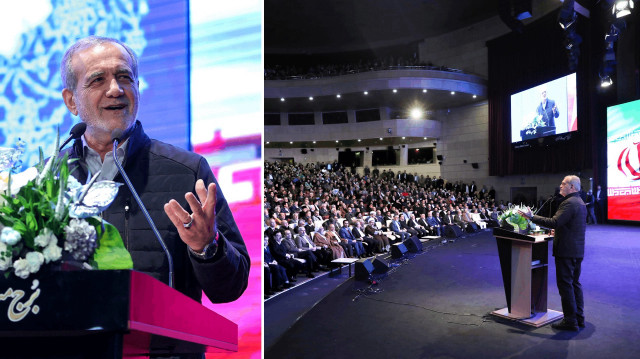Iranian President Masoud Pezeshkian made headlines when he recited a well-known Azerbaijani Turkish poem, Heydar Baba’ya Salam by the famous poet Mohammad Hossein Shahriar, during the closing ceremony of Tabriz Culture Week. This event, which took place in Tabriz, Iran, sparked reactions due to the sensitive nature of language policies in Iran, particularly concerning the use of Turkish in public settings.
Official Objection and Pezeshkian’s Defiance
Before beginning his recitation, Pezeshkian revealed that officials had advised against speaking Turkish, as there were attendees in the hall who did not understand the language. However, despite the warning, he proceeded to recite the poem.
While he was reading, an official approached him on stage and attempted to interrupt him, reiterating concerns about speaking Turkish. However, Pezeshkian firmly dismissed the objections, responding, “No problem, reading two Turkish poems won’t cause any issues,” and continued his recital. His defiant stance drew applause from the audience, many of whom were visibly supportive of his decision to embrace and showcase the Azerbaijani Turkish language.
The Historical and Political Context
The event immediately reignited discussions about language rights and ethnic identity in Iran, particularly among the country’s large Azerbaijani Turkic population. Although Iran officially recognizes Persian as the country’s sole official language, a significant portion of its population—estimated between 15 to 25 million people—are ethnic Azerbaijani Turks, most of whom reside in northwestern Iran, including cities like Tabriz, Urmia, Ardabil, and Zanjan.
In previous Iranian administrations, the public use of Azerbaijani Turkish has been a contentious issue. While it is commonly spoken among the Azerbaijani population, its official and educational use remains restricted. Iranian law does allow for the teaching of local languages alongside Persian, but in practice, there have been limitations and resistance to expanding Turkish-language education and media.
Iran’s Geopolitical Concerns: The Growing Influence of Turkey and Azerbaijan
Iran has long been wary of Turkey and Azerbaijan’s growing influence in the South Caucasus, particularly following Azerbaijan’s victory over Armenia in the 2020 Nagorno-Karabakh War and its subsequent recapture of the region in 2023. This geopolitical shift has significantly altered the balance of power in Iran’s northern neighborhood, deepening Tehran’s concerns about Turkish and Azerbaijani expansionism.
1. The Impact of the Nagorno-Karabakh Conflict
The retaking of Nagorno-Karabakh by Azerbaijan in 2023 marked a turning point in regional geopolitics. Iran had historically maintained strong ties with Armenia as a counterbalance to Azerbaijan’s growing power and its close strategic alliance with Turkey. Following Azerbaijan’s military success, Iran has grown increasingly concerned that Baku—encouraged by Turkish support—may push for further territorial or political gains that could destabilize Iran’s northern borders.
One of Tehran’s primary concerns is the idea of a “Pan-Turkic corridor”—a vision supported by Turkey and Azerbaijan that aims to create a continuous land connection between Turkey, Azerbaijan, and Central Asia through the Zangezur Corridor in Armenia. This corridor, if fully established, would:
- Weaken Iran’s strategic influence in the Caucasus.
- Diminish Iran’s access to Armenia and the broader region.
- Strengthen Turkish and Azerbaijani economic and military ties, further isolating Iran.
Iran has explicitly opposed this project, warning that any changes to Armenia’s territorial integrity could lead to a regional conflict.
2. Fears of Azerbaijani Nationalism Spilling Over into Iran
Iran is home to a large Azerbaijani Turkish population, estimated between 15 to 25 million people, primarily in northwestern Iran. Tehran has always been cautious about Azerbaijani nationalism gaining traction within its borders, fearing that it could fuel separatist sentiments among Iranian Azerbaijanis.
Azerbaijan’s victory in Karabakh and its rising status as a Turkic power aligned with Turkey have emboldened some nationalist movements among Iranian Azerbaijanis. Calls for greater recognition of Azerbaijani Turkish culture, language, and even closer ties to Baku have become more pronounced, alarming Iranian authorities.
Iran has accused Azerbaijan of:
- Encouraging separatist sentiments within Iran’s Azerbaijani population.
- Hosting Iranian opposition figures and media outlets that promote Azerbaijani nationalism.
- Allowing Israeli intelligence operations to be carried out near Iran’s northern border.
3. Iran-Turkey Rivalry: Competition for Influence
Beyond Azerbaijan, Iran also sees Turkey’s growing regional role as a direct challenge to its own influence. Turkey has positioned itself as a key player in the South Caucasus, Central Asia, and even parts of the Middle East, often competing with Iran for strategic dominance.
- Turkey’s use of soft power—including language, culture, and pan-Turkic identity—has expanded its influence among Turkic communities in Iran, Central Asia, and the Caucasus.
- The Turkish-Azerbaijani military alliance has strengthened Azerbaijan’s armed forces, with joint drills often taking place near Iran’s borders.
- Turkey’s close ties with NATO and its deepening military presence in the region have further complicated Iran’s security calculations.
Iran sees these developments as part of a broader strategy by Turkey and Azerbaijan to marginalize Iran’s role in the region, potentially even fomenting instability within its own borders.
Public Reaction and Political Implications
The audience’s positive reaction to Pezeshkian’s poem recital underscores the deep emotional and cultural ties Azerbaijani Turks have to their language and identity. It also sheds light on the ongoing demands for greater linguistic and cultural rights in Iran.
On the other hand, the reaction of the officials, who immediately tried to stop him, highlights the ongoing sensitivities within the Iranian establishment regarding ethnic and linguistic diversity.
The event is likely to fuel discussions about Iran’s language policies, particularly whether the Azerbaijani Turkish language should have greater public recognition.
Conclusion: A Broader Regional Power Struggle
Pezeshkian’s decision to publicly recite an Azerbaijani Turkish poem despite official warnings has sparked renewed conversations about linguistic freedom, ethnic identity, and cultural diversity in Iran. Given his own Azerbaijani roots and his position as the country’s president, this event could signal a potential shift in Iran’s approach to its diverse ethnic communities—or at the very least, a growing debate over language rights and inclusion in Iranian society.
At the same time, it highlights the broader geopolitical challenges Iran faces, as Turkey and Azerbaijan strengthen their regional presence. Tehran remains caught between appeasing its own Azerbaijani population while preventing separatist sentiments, maintaining influence in the Caucasus while competing with Turkey and Azerbaijan, and countering the rise of a Pan-Turkic alliance that could weaken its strategic position.







